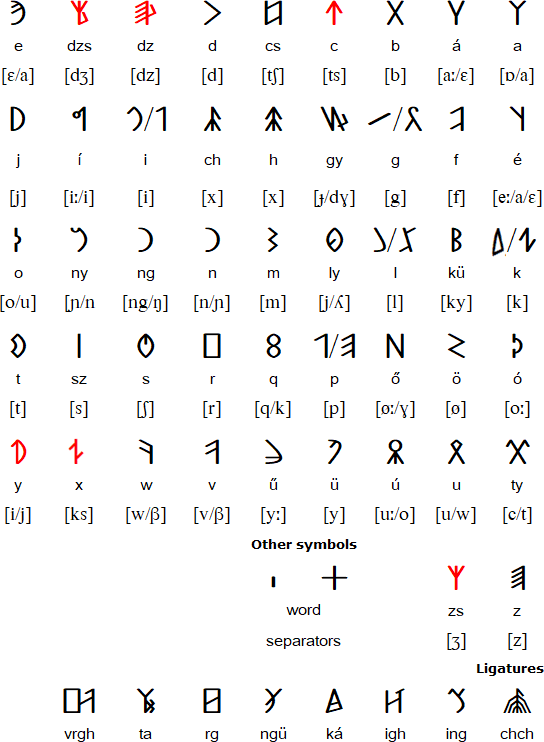Carpathian Basin Rovas is thought to be a descendent of the Proto-Rovas script, which was used to the east of the Aral Sea between about the 1st century AD and 567, when the tribes who were using it, the Avars and Ogurs, started to move into the Carpathian Basin. That process took until about 670 AD, after which the Proto-Rovas script became the Carpathian Basin Rovas and the Khazarian Rovas scripts. The Proto-Rovas script was perhaps a descendent of the Aramaic script.
Since 2009 efforts have been made to revive the use of this alphabet. Some letters were added to it to represent sounds in modern Hungarian that weren't used historically.
Notable features
- Type of writing system: alphabet
- Direction of writing: right to left in horizontal lines
- Used to write: Hungarian, Onogur, As-Alan, Slavic and Eurasian Avar.
Carpathian Basin Rovas

Letters in red were not used historically, and
in most cases IPA transcriptions show the modern pronunciation
of letters on the left and the historical pronunciation (where
different) on the right.
Sample text

Blessed Lady Our Mother, a Christian song
Links
Information about Carpathian Basin Rovashttp://wiki.rovas.info/index.php/Carpathian_Basin_Rovas
http://std.dkuug.dk/jtc1/sc2/wg2/docs/n4144.pdf
http://books.google.com/books?id=TyK8azCqC34C&lpg=PA3&hl=hu&pg=PA107#v=onepage&q&f=false
Carpathian Basin Rovas font
http://www.freeweb.hu/rovasirashonlap/betuk/betuk_karpat-medencei_rovas.html

No comments:
Post a Comment
Note: Only a member of this blog may post a comment.